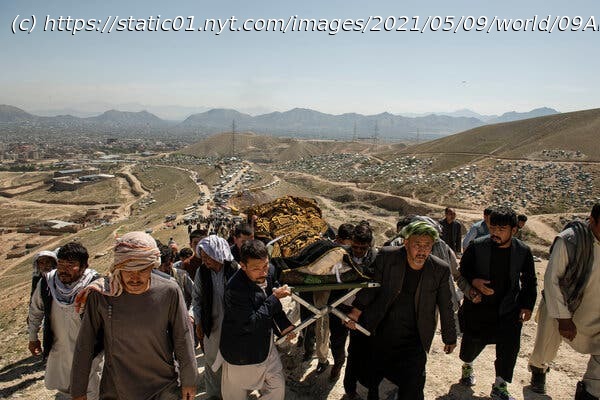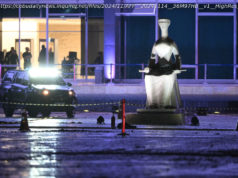A bomb attack that killed scores of schoolgirls, members of a long-persecuted minority, offered still more evidence that Afghanistan may be on the verge unraveling.
One by one they brought the girls up the steep hill, shrouded bodies covered in a ceremonial prayer cloth, the pallbearers staring into the distance. Shouted prayers for the dead broke the silence. The bodies kept coming and the gravediggers stayed busy, straining in the hot sun. The ceaseless rhythm was grim proof of the preceding day’s news: Saturday afternoon’s triple bombing at a local school had been an absolute massacre, targeting girls. There was barely room atop the steeply pitched hill for all the new graves. The scale of the killing and the innocence of the victims seemed further unnerving proof of the country’s violent unraveling, as the Taliban make daily gains and the government seems unable to halt their advances or protect its people from mass killings. On Sunday there were mourners everywhere in the neighborhood of the bombing, home to the persecuted Shiite Hazara ethnic minority, but hardly any security to protect them. The death toll — possibly reaching over 80 young girls — exceeded even previous massacres in this bustling neighborhood of a minority long singled out for persecution by the Taliban and, in recent years, the Islamic State. Afghanistan’s second vice president, Sarwar Danesh, himself a Hazara, said over 80 girls had been killed in the attack. After the 2001 American invasion, the Hazara were a minority that made the most of the country’s new educational and business opportunities, and they make up a large part of the country’s young technocrat generation. But through it all, Hazara Shiites became a target of choice for Sunni militants like the new Taliban insurgency and ISIS. They have grown increasingly angry at the government, accusing the security forces of standing by while they suffer horrific casualties. Now, on the edge of what many fear will become a return of Taliban rule in many areas, and a new civil war some see as inevitable, the Hazara are increasingly determined to take their security into their own hands. On Sunday, a wheelbarrow stacked with the bloodied clothing of the girls, packed tight in plastic bags, was parked outside one mosque where bodies had been brought. At another mosque, a basement room, crowded with black-robed women, echoed with muffled sobs. At a third mosque grim-faced men clustered on the steps, murmuring about taking up guns and joining forces with a Hazara warlord named Abdul Ghani Alipur, who is on the run from the government.






